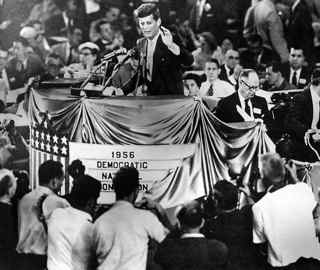February 3, 2012
JACK KENNEDY, ELUSIVE HERO: DEBUT
Knoxville, Tennessee (JFK+50) Today JFK+50 reports on Chapter 9 of Chris Matthews' new book, Jack Kennedy, Elusive Hero, published by Simon & Schuster.
The title of Chapter 9 is DEBUT.
In the summer of 1956, I turned 8 years old. It would be 4 more years before I would know of John F. Kennedy. But 1956 was the year that JFK made his appearance on the national stage.
Chris begins Chapter 9 by writing that when 1956 began "Jack Kennedy was far from a household name," but by year's end, he was "the most exciting Democratic challenger for the presidency."
Jack Kennedy turned 39 years old on May 29, 1956. Chris tells us that Teddy White told Jack that his name was on Adlai Stevenson's "shortlist" to be his Democratic running mate.
Before tackling that topic, however, Chris writes about the power struggle in Massachusetts between Jack & State Democratic Party Chairman, William "Onions" Burke.
Chris, not surprisingly, calls this episode "hardball."
To make a long story short, it was Jack's candidate for state chairman who ended up winning by a 2 to 1 margin at the Bradford Hotel in downtown Boston.
Chris writes that Jack turned over the job of presenting his case for 2nd on the ticket to Ted Sorensen.
A Sorensen-penned argument was sent out to "50 top Democrats" & at the convention Jack was given the opportunity to narrate a documentary film to be presented the 1st night.
The film, titled The Pursuit of Happiness, according to Chris, made JFK the "star of the night" & made everything that had happened to him before that night simply a "prelude."
Adlai Stevenson then picked Jack to give his #1 nominating speech, one which would discuss "two tough candidates, one who takes the high road (IKE) & one who takes the low road (NIXON)."
Then on Thursday night, Adlai surprised everyone by announcing that he wanted the delegates to choose his running mate.
The leading candidate was Senator Estes Kefauver of Tennessee, but JFK couldn't let this opportunity pass him by.
Chris writes when Father Joe heard the news that Jack had thrown his hat into the ring, he was, "livid."
While Jack probably wasn't that surprised by his Dad's response, he was surprised by the strong support he got in the South.
Chris says that Jack received much "goodwill as a result of his war heroism & his reputation as a moderate."
After the 2nd ballot, Jack was just 40 votes short of victory.
Then, on the 3rd ballot, Chris tells us "the religious issue" began to surface.
Oklahoma switched its vote to Kefauver & fellow Tennessee Senator Albert Gore, Sr. announced his delegates were being released to KEFAUVER.*
Even before the 3rd ballot was finished, Jack Kennedy was on the speaker's platform, giving his congratulations to Senator Kefauver & asking the delegates to make his nomination unanimous.
Chris eloquently writes it was that very moment in which Jack Kennedy made his "unforgettable debut as a national leader."**
Senator Jack Kennedy
1956 Democratic National Convention
*Estes Kefauver, who served as senator from 1949 to 1963, was born in Madisonville, Tennessee. He attended the University of Tennessee, Knoxville & received his LLB from Yale (1927).
Kefauver was chairman of a Senate committee investigating organized crime in 1950 & died of a heart attack on August 8, 1963.
The following November, President Kennedy appointed his widow as the 1st head of the Art in Embassies Program. It was to be his last appointment.
Senator Estes Kefauver
(D) Tennessee
**JFK+50 comment.
In my view, one of the things that Americans respect most in their leaders is the ability to admit defeat or wrong. JFK was raised to be a winner & this was to be the only political race he would ever lose, but he knew how to lose with grace & dignity. After the failure of the Bay of Pigs, he publicly accepted responsibility & Americans responded by giving him their approval & support.



.jpg)